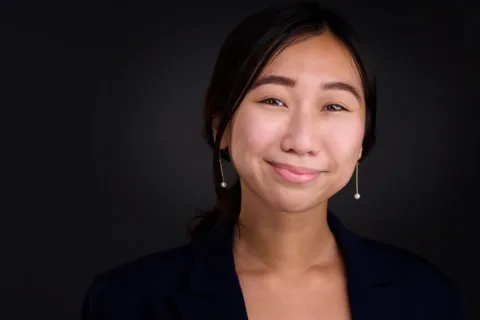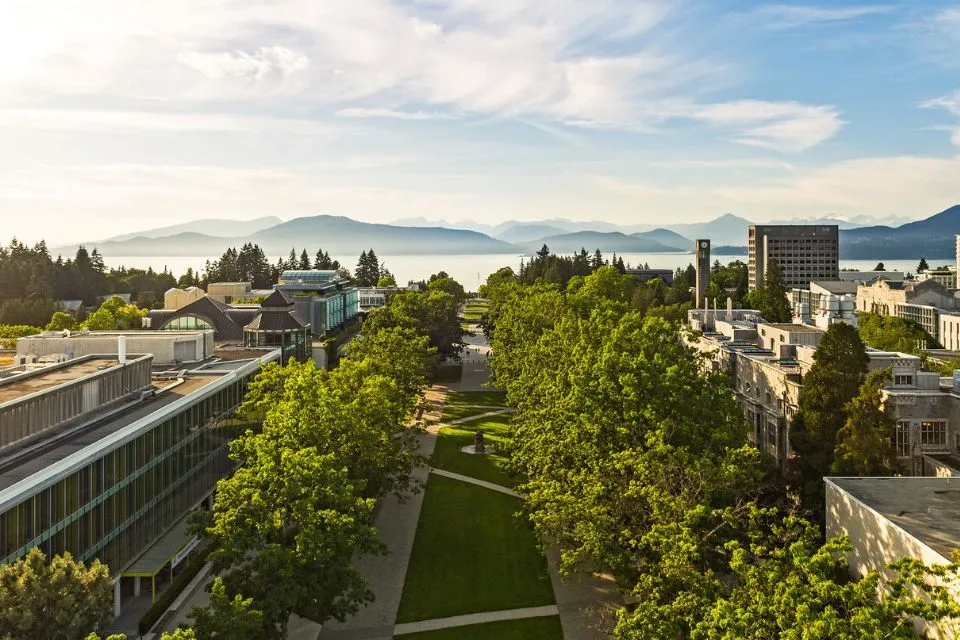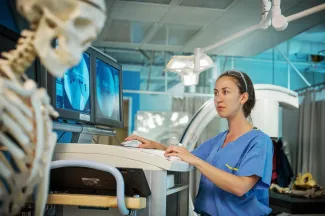"Our lived experiences and out-of-classroom experiences are what will be most valuable to our engineering learning journeys, making us into more socially conscious engineers."

Jess Tran
- Degree:
- Bachelor of Applied Science
- Grad year: 2024
- Program:
- Campus: Vancouver
My name is Jess and I am a 2024 undergraduate Biomedical Engineering graduate. Completing an engineering degree at UBC has been a huge life accomplishment—not only for myself but for my parents, especially my father who was not able to complete his civil engineering degree in Vietnam. However, my undergrad experience has been bittersweet as it took me a while to find stable footing within engineering. My education at UBC is deeply shaped by my positionalities as a queer femme low-income first-generation student who was born and raised in so-called Canada on the traditional and treaty territories of the Mississaugas of the Credit First Nations.
Moving forward, I am dedicated to promoting justice-oriented learning in engineering through my graduate studies at UBC in engineering education research.
Why did you choose to study Biomedical Engineering?
As with many of my peers, I chose to pursue biomedical engineering to make a positive impact, particularly in improving the accessibility of healthcare technologies. Although, before university, I didn’t really know what engineering was! I was lucky to have teachers in high school who really rooted for me and encouraged me to pursue engineering, in part to break the gendered barriers of engineering education.
I visited the UBC Vancouver campus, situated on the ancestral and unceded lands of xʷməθkʷəy̓əm (Musqueam), Sḵwx̱wú7mesh (Squamish), and səlilwətaɬ (Tsleil- Waututh) nations, for the first time as part of a month-long high school summer program in 2017. That was the first time I saw mountains and safe to say, seeing the campus sealed the deal for me.
What has made your time at UBC memorable?
In addition to a major in engineering, I also completed a minor in human geography where I was introduced to different lenses to investigate social and environmental issues as they are entangled within broader socioeconomic structures and systems. Through my learning experiences from geography and my interests in social justice, I was keen to engage in more topics pertaining to the social implications of biomedical engineering designs.
I brought this up to Dr. Robyn Newell one day after a biomechanics class and our discussion sparked a year-long project aimed at incorporating EDI curriculum elements into her third-year biomechanics course, BMEG 330. For this project, we incorporated ‘Journal Club’ discussions into the course to encourage student discussions about the lack of human diversity in biomechanics research and design.
This project was supported by the Students as Partners (SaP) Course Design Grant from the UBC Center for Teaching, Learning, and Technology (CTLT). As part of this grant, our project functioned as a reciprocal partnership between students and instructor which totally changed the trajectory of my engineering education journey, empowering me to have a voice in course design. Since then, I have been engaged in other engineering education projects related to exploring inclusion within informal STEM (Science, Technology, Engineering and Maths) education, such as STEM summer camps.
What challenges did you face and overcome during your degree?
Throughout my engineering degree, I struggled to secure a sense of belonging in the program. The archetypes of a ‘good engineer’, rooted in white middle-class heteromasculinity, did not align with my intersecting identities. Because of this, I sought out a minor in geography and began to participate in engineering and non-engineering extracurricular activities on campus, allowing me to feel more grounded within the broader student community.
Through engaging deeply with critical theory and engineering education research, I started to recognize the ways in which the educational system has not been designed to support minoritized students outside the dominant norms. Through research in engineering education, I have begun to question the narratives that minoritized students are at a ‘deficit’. Instead, I now urge that students’ lived experiences and non-engineering out-of-classroom experiences are tremendous assets to our engineering learning journeys, especially in promoting more socially conscious engineering.
Where did you find community within UBC?
For engineering extracurriculars, I was part of the student design team, UBC AeroDesign, for 3 years which was an incredibly fun and rewarding experience. My sub-team leads were both women in mechanical engineering who were incredibly supportive and inspiring mentors. Having great role models during the early days of my undergrad was really important in helping me feel empowered within these technical male-dominated engineering spaces.
Outside of engineering, I volunteered at UBC Sprouts for the last two years of my undergrad. Sprouts is a great student-run cafe addressing food insecurity on campus! There are also tons of other great extracurriculars on campus that are committed to making a difference on campus, dedicated to social justice, and building student community such as Roots on the Roof, UBC Social Justice Center, UBC Pride Collective, and the Food Hub Market, to name a few.
What advice would you give a student entering your degree program?
I would encourage students to seek out diverse learning experiences both inside and outside of the classroom. Take courses that challenge the dominant epistemologies of our engineering discipline, volunteer or work in the community, and participate in student extracurriculars, both engineering and non-engineering related. Engineering design problems are only going to become more socially challenging (coined “wicked problems”). As such, engineering alone will not be enough to solve multifaceted social, economic and environmental problems that our generation faces.
While our engineering classrooms are beginning to shift and adapt, valuable learning experiences also come from outside the classroom! And if possible, take your time. I am really thankful that I was able to extend my undergrad to six years to give myself time to consider and work toward my future goals.
Where do you find your inspiration for using your degree to make an impact on our world?
My inspirations for completing my degree and using my degree to make a positive impact are largely attributed to several of my previous women professors in engineering who are incredibly dedicated to teaching and promoting EDI in engineering education, namely, Dr. Robyn Newell & Dr. Agnes d’Entremont. As women in engineering faculty, they have broken barriers and continue to do so, while supporting students who also seek to make engineering a more inclusive and equitable space. Although, it is important to also highlight that women faculty members perform disproportionally greater amounts of emotional labour and care work, especially within engineering!
I am currently planning to pursue a master’s degree in engineering education research, starting September 2024, focusing on access, privilege and justice-oriented pedagogies in STEM outreach spaces. I strongly believe that education can so often be a place of joy when inclusive, focused on an ethics of care, and grounded in place and relations, and I hope to conduct work in this field centring these principles.
While great efforts are being made to improve equity, diversity and inclusivity within UBC Applied Science, engineering as a field continues to reproduce hegemonic norms that limit historically marginalized students’ experiences of belonging in engineering. On this note, I’d like to echo last year’s APSC spotlight, Ashely Kairu, who makes a call for UBC Engineering to consider the lack of Black faculty members. As a first step towards changing the landscape, representation and associated supports for both students and faculty are key to enhancing the student experience in engineering.





